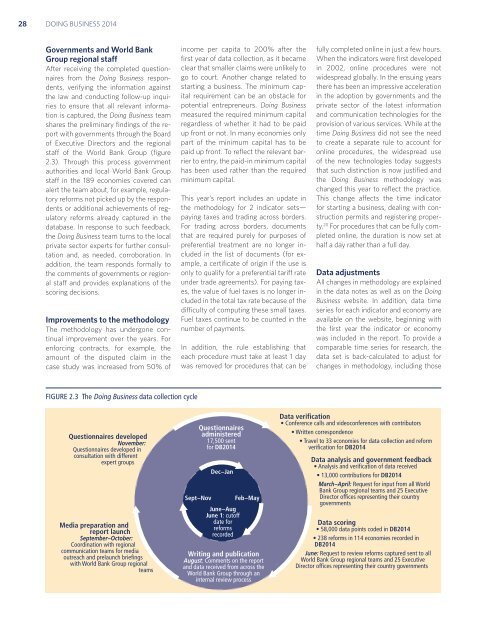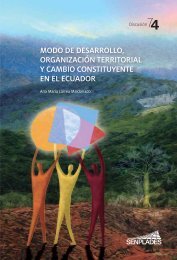1gGgw9ScK
1gGgw9ScK
1gGgw9ScK
You also want an ePaper? Increase the reach of your titles
YUMPU automatically turns print PDFs into web optimized ePapers that Google loves.
28<br />
DOING BUSINESS 2014<br />
Governments and World Bank<br />
Group regional staff<br />
After receiving the completed questionnaires<br />
from the Doing Business respondents,<br />
verifying the information against<br />
the law and conducting follow-up inquiries<br />
to ensure that all relevant information<br />
is captured, the Doing Business team<br />
shares the preliminary findings of the report<br />
with governments through the Board<br />
of Executive Directors and the regional<br />
staff of the World Bank Group (figure<br />
2.3). Through this process government<br />
authorities and local World Bank Group<br />
staff in the 189 economies covered can<br />
alert the team about, for example, regulatory<br />
reforms not picked up by the respondents<br />
or additional achievements of regulatory<br />
reforms already captured in the<br />
database. In response to such feedback,<br />
the Doing Business team turns to the local<br />
private sector experts for further consultation<br />
and, as needed, corroboration. In<br />
addition, the team responds formally to<br />
the comments of governments or regional<br />
staff and provides explanations of the<br />
scoring decisions.<br />
Improvements to the methodology<br />
The methodology has undergone continual<br />
improvement over the years. For<br />
enforcing contracts, for example, the<br />
amount of the disputed claim in the<br />
case study was increased from 50% of<br />
income per capita to 200% after the<br />
first year of data collection, as it became<br />
clear that smaller claims were unlikely to<br />
go to court. Another change related to<br />
starting a business. The minimum capital<br />
requirement can be an obstacle for<br />
potential entrepreneurs. Doing Business<br />
measured the required minimum capital<br />
regardless of whether it had to be paid<br />
up front or not. In many economies only<br />
part of the minimum capital has to be<br />
paid up front. To reflect the relevant barrier<br />
to entry, the paid-in minimum capital<br />
has been used rather than the required<br />
minimum capital.<br />
This year’s report includes an update in<br />
the methodology for 2 indicator sets—<br />
paying taxes and trading across borders.<br />
For trading across borders, documents<br />
that are required purely for purposes of<br />
preferential treatment are no longer included<br />
in the list of documents (for example,<br />
a certificate of origin if the use is<br />
only to qualify for a preferential tariff rate<br />
under trade agreements). For paying taxes,<br />
the value of fuel taxes is no longer included<br />
in the total tax rate because of the<br />
difficulty of computing these small taxes.<br />
Fuel taxes continue to be counted in the<br />
number of payments.<br />
In addition, the rule establishing that<br />
each procedure must take at least 1 day<br />
was removed for procedures that can be<br />
fully completed online in just a few hours.<br />
When the indicators were first developed<br />
in 2002, online procedures were not<br />
widespread globally. In the ensuing years<br />
there has been an impressive acceleration<br />
in the adoption by governments and the<br />
private sector of the latest information<br />
and communication technologies for the<br />
provision of various services. While at the<br />
time Doing Business did not see the need<br />
to create a separate rule to account for<br />
online procedures, the widespread use<br />
of the new technologies today suggests<br />
that such distinction is now justified and<br />
the Doing Business methodology was<br />
changed this year to reflect the practice.<br />
This change affects the time indicator<br />
for starting a business, dealing with construction<br />
permits and registering property.<br />
20 For procedures that can be fully completed<br />
online, the duration is now set at<br />
half a day rather than a full day.<br />
Data adjustments<br />
All changes in methodology are explained<br />
in the data notes as well as on the Doing<br />
Business website. In addition, data time<br />
series for each indicator and economy are<br />
available on the website, beginning with<br />
the first year the indicator or economy<br />
was included in the report. To provide a<br />
comparable time series for research, the<br />
data set is back-calculated to adjust for<br />
changes in methodology, including those<br />
FIGURE 2.3 The Doing Business data collection cycle<br />
Questionnaires developed<br />
November:<br />
Questionnaires developed in<br />
consultation with different<br />
expert groups<br />
Media preparation and<br />
report launch<br />
September−October:<br />
Coordination with regional<br />
communication teams for media<br />
outreach and prelaunch briefings<br />
with World Bank Group regional<br />
teams<br />
Sept−Nov<br />
Questionnaires<br />
administered<br />
17,500 sent<br />
for DB2014<br />
Dec−Jan<br />
June−Aug<br />
June 1: cutoff<br />
date for<br />
reforms<br />
recorded<br />
Feb−May<br />
Writing and publication<br />
August: Comments on the report<br />
and data received from across the<br />
World Bank Group through an<br />
internal review process<br />
Data verification<br />
Conference calls and videoconferences with contributors<br />
Written correspondence<br />
Travel to 33 economies for data collection and reform<br />
verification for DB2014<br />
Data analysis and government feedback<br />
Analysis and verification of data received<br />
13,000 contributions for DB2014<br />
March−April: Request for input from all World<br />
Bank Group regional teams and 25 Executive<br />
Director offices representing their country<br />
governments<br />
Data scoring<br />
58,000 data points coded in DB2014<br />
238 reforms in 114 economies recorded in<br />
DB2014<br />
June: Request to review reforms captured sent to all<br />
World Bank Group regional teams and 25 Executive<br />
Director offices representing their country governments



